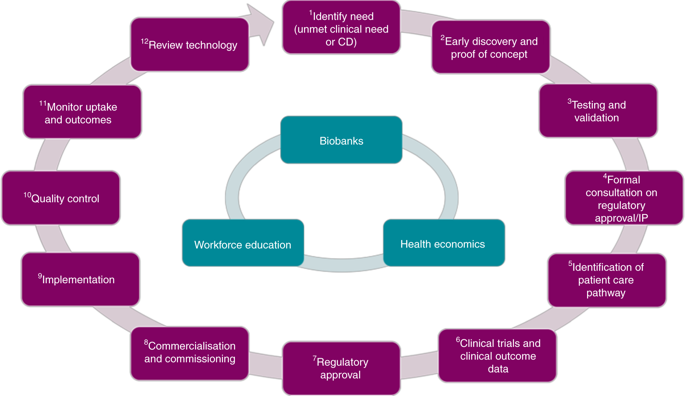
Pathology has evolved from a purely morphological description of cellular alterations in disease to our current ability to interrogate tissues with multiple ‘omics’ technologies. By utilising these techniques and others, ‘molecular diagnostics’ acts as the cornerstone of precision/personalised medicine by attempting to match the underlying disease mechanisms to the most appropriate targeted therapy.
Methods
Despite the promises of molecular diagnostics, significant barriers have impeded its widespread clinical adoption. Thus, the National Cancer Research Institute (NCRI) Cellular Molecular Pathology (CM-Path) initiative convened a national Molecular Diagnostics Forum to facilitate closer collaboration between clinicians, academia, industry, regulators and other key stakeholders in an attempt to overcome these.
Results
We agreed on a consensus ‘roadmap’ that should be followed during development and implementation of new molecular diagnostic tests. We identified key barriers to efficient implementation and propose possible solutions to these. In addition, we discussed the recent reconfiguration of molecular diagnostic services in NHS England and its likely impacts.
Conclusions
We anticipate that this consensus statement will provide practical advice to those involved in the development of novel molecular diagnostic tests. Although primarily focusing on test adoption within the United Kingdom, we also refer to international guidelines to maximise the applicability of our recommendations.
Meghan Acres (Newcastle upon Tyne Hospitals NHS Foundation Trust), Rebecca Albrow (National Institute for Health and Care Excellence), Graeme Black (University of Manchester), Richard Booth (National Physical Laboratory), Victoria Brown (United Kingdom Accreditation Service), Maria Antonietta Cerone (Cancer Research UK), Richard Colling (University of Oxford), Jane Coppard (Roche Diagnostics), Sarah E. Coupland (University of Liverpool), Caroline Cowley (Leicester Cancer Research Centre), Clare Craig (Genomics England), Sandi Deans (NHS England), Ming Du (University of Cambridge), Carl Edwards (Leicester Precision Medicine Institute), Andrew Feber (University College London), Daniel Gosling (NHS England), Marta Hall (ThermoFisher Scientific), Sidonie Hartridge-Lambert (Bristol-Myers Squibb), Louise Jones (Genomics England and Barts Cancer Institute), Jessica Lee (National Cancer Research Institute), Amy Liu (Roche), Philip Macklin (University of Oxford), Fabrice Mangino (Illumina), Stuart McCann (Roche Diagnostics), Jonny McHugh (Illumina), Keith Miller (UK National External Quality Assessment Service), Daniel O’Connor (Medicines and Healthcare products Regulatory Agency), Karin Oien (University of Glasgow), Thomas Oliver (University of Cambridge), Nischalan Pillay (University College London), Manuel Rodriguez-Justo (University College London), Sophie Scott (Guardant Health), Clare Verrill (University of Oxford), Jayson Wang (St George’s Hospital, London), Doris-Ann Williams (British In Vitro Diagnostics Association).
These authors contributed equally: Sarah E. Coupland, Clare Verrill
Conceptualisation—C.V., S.E.C. and K.A.O. Methodology—C.V., S.E.C., K.A.O., N.P. and J.W. Resources—C.V., S.E.C., K.A.O., J.L.L. and H.P. Data curation—P.S.M., S.E.C., C.V., J.L.L. and H.P. Writing—original draft—P.S.M., S.E.C. and C.V. Writing—review and editing—P.S.M., N.P., J.L.L., H.P., S.S., J.W., C.C., J.L.J., K.A.O., R.C., S.E.C. and C.V. Visualisation—P.S.M., J.L.L. and H.P. Supervision—C.V. and S.E.C. Project administration—C.V., S.E.C., J.L.L. and H.P. Funding acquisition—not applicable.
P.S.M., N.P., J.L.L., H.P., S.S., J.W., C.C., J.L.J., R.C. and S.E.C. have nothing to disclose. K.A.O. reports grants from the National Cancer Research Institute, during the conduct of the study; grants from Leica Biosystems, grants from Qiagen, non-financial support from ThermoFisher, non-financial support from Illumina, non-financial support from Aridhia, non-financial support from Sistemic, non-financial support from BioClavis and non-financial support from Biotheranostics, outside the submitted work. C.V. reports support from the National Cancer Research Institute CM-Path initiative, from the NIHR Oxford Biomedical Research Centre and from Cancer Research UK Oxford Cancer Centre during the conduct of the study.
Not applicable
The NCRI’s CM-Path initiative was established in 2016 with the aim of re-invigorating academic pathology. It is funded as a collaborative venture between ten of the NCRI partner organisations: Bloodwise, Breast Cancer Now, Cancer Research UK, the Chief Scientist Office (Scotland), the Department of Health and Social Care (England), Health and Care Research Wales, Health and Social Care (Northern Ireland), the Medical Research Council, Prostate Cancer UK and Tenovus Cancer Care. These organisations did not participate in study design; collection, analysis and interpretation of data; writing the report or the decision to submit the paper for publication. Nischalan Pillay’s research time is funded by a Cancer Research UK Clinician Scientist fellowship. Clare Verrill’s research time is supported by the National Institute for Health Research (NIHR) Oxford Biomedical Research Centre (BRC). The views expressed are those of the author(s) and not necessarily those of the NHS, the NIHR or the Department of Health.
Not applicable
Not applicable
Note: This work is published under the standard license to publish agreement. After 12 months the work will become freely available and the license terms will switch to a Creative Commons Attribution 4.0 International (CC BY 4.0).
Publisher’s note Springer Nature remains neutral with regard to jurisdictional claims in published maps and institutional affiliations.
CM-Path Molecular Diagnostics working group members are listed below the Acknowledgements section.
Rights and permissions
Reprints and Permissions
About this articleReceived
06 April 2019
Revised
03 September 2019
Accepted
06 September 2019
Published
02 October 2019
DOI
https://doi.org/10.1038/s41416-019-0588-1
